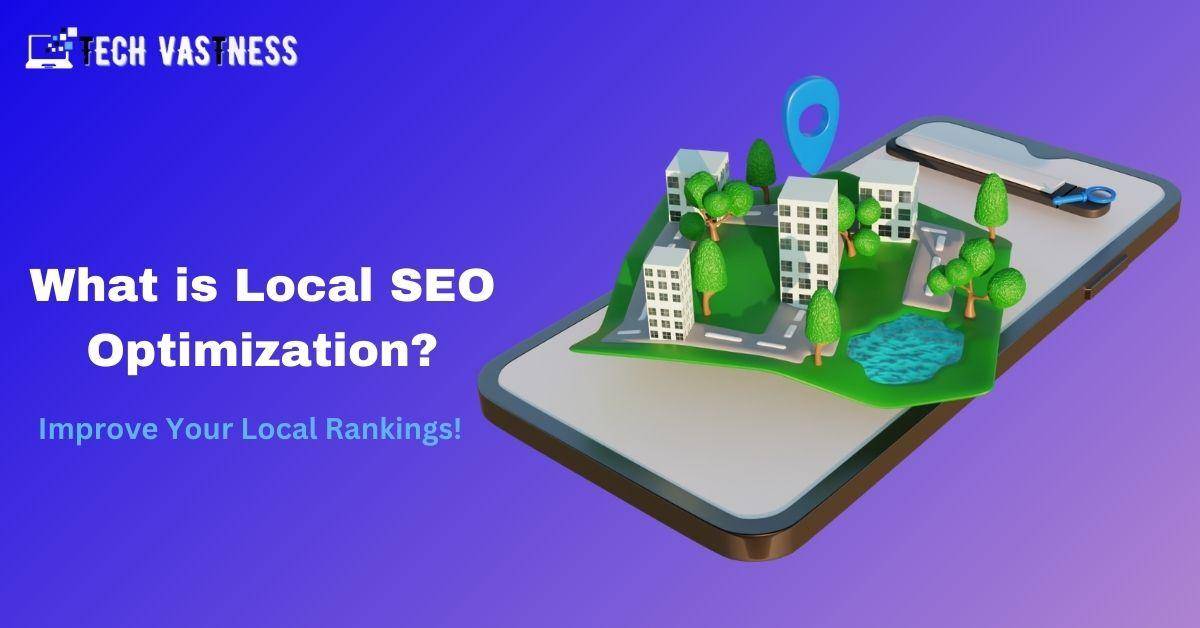Are you a small business that wants to get more clients from your local area? What is local SEO optimization? As a result, local SEO is one of the most powerful marketing strategies you can use.
Local and organic searches account for 69% of website traffic, making it incredibly cost-effective. In other words, you’re missing out if you aren’t optimized for local searches.
Local SEO in digital marketing allows businesses with their stores to connect with people in that area by enhancing their online visibility and boosting search engine rankings. So, the business must optimize its local SEO listings to attract more people within that specific location.
But what is local SEO optimization and how does local SEO work?
I will answer those questions and many more in this article’s in-depth guide. You’ll learn what makes local SEO unique and the steps you can take to rank higher in local searches.
What is Local Search Engine Optimization?
Google spares no effort to provide good answers and solutions to user queries. Hence, when the Google algorithm realizes that the user is seeking something, services, or products, in the nearby area, it displays local search results.
It shows organic results regarding local businesses. So, businesses and marketers use local SEO to ensure that their service or product is shown at the top of local search results.
What is local SEO optimization means the practice of optimizing a website or business listing to improve its online visibility in local search engine results? It focuses on making a site SEO-friendly for local searches.
SEO is a broader concept focused on optimizing a website and boosting its search engine rankings to generate organic traffic. On the other hand, local SEO, a separate branch of SEO, is primarily about optimizing web pages to earn top rankings for local queries based on a particular location.
We all know that Google is so smart. Hence, the search engine detects local search intent easily and offers accurate results. That is why it’s essential for local businesses catering to a specific area and with a store to use local SEO to gain visibility when users look for services or goods in that location.
What is local SEO optimization in digital marketing is a hassle-free technique that demands little effort but extensive knowledge.
The key what is local SEO optimization tasks include:
- Determining targeted local keywords
- Optimize Google Business Profile
- Create optimize content
What is Local SEO Optimization Essential Fact?
- What is local SEO optimization is the practice of improving the online visibility of your businesses in local searches on Google and other search engines.
- Local SEO is unique because you rank for Google’s Local Pack as well as its organic search results.
- There are different ranking factors for organic search results and the Local Pack.
- Important ranking factors for organic results are on-page SEO optimization and links.
- Important ranking factors for the Local Pack are your Google Business Profile, reviews, and on-page SEO optimization.
What Makes Local SEO Optimization Unique?
Let’s get started with the question people ask me most on this topic: What is local SEO optimization?
Local SEO is the best practice for improving the online visibility of local businesses or services in Google and other search engines. It’s the same as organic SEO in some ways, but in others, it’s completely different.
Specifically, local SEO aims to appear top in search engine result pages (SERPs) for localized searches — that’s any search mentioning a geographic area or using the phrase “near me.”
But there’s another element of local SEO optimization you don’t have to worry about with regular SEO: Google’s Map Pack. The Google Map Pack is present in almost every localized search and ranks service or business’ Google Business Profile.
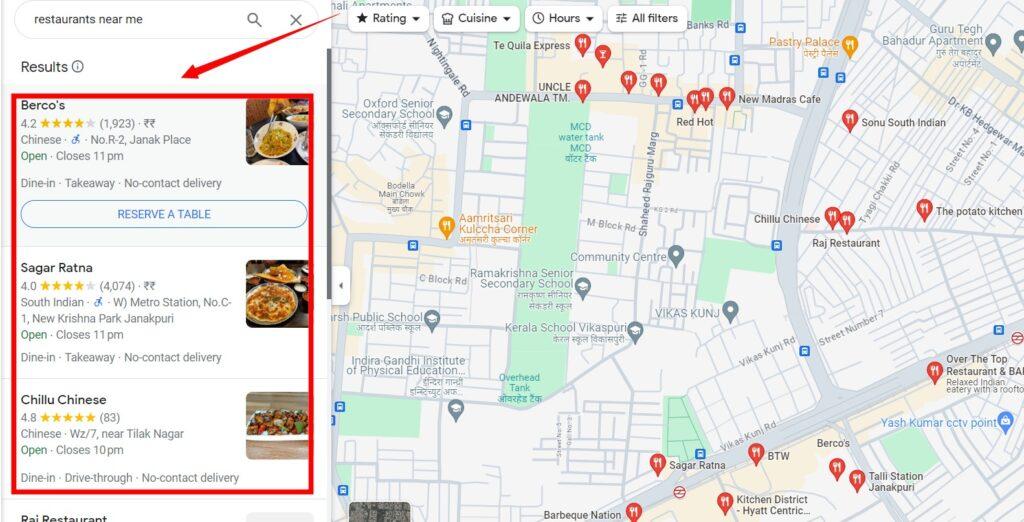
This makes local SEO optimization unique. You’re not just optimizing for Google’s organic search results. Rather you’re also optimizing for Google’s Local Pack.
Why is Local SEO Important?
- Okay, now you know what local SEO optimization marketing is, let’s cover the second most important thing: why local SEO optimization matters.
- 86% of users trust Google Maps to seek the location of a business or store.
- In a recent survey, 61% of users have agreed that they search for local businesses or stores every day.
- According to Google, 76% of users conducting local searches on mobiles visit the stores within the next 24 hours, and 28% of these searches result in buys.
- Google processes 30% of these searches related to specific locations.
- According to a recent survey, around 82% of consumers go via online reviews and feedback during local searches, spending around 14 minutes reading reviews before making a purchase decision.
- Over half of internet users in the world prefer smartphone devices for local searches.
- 55% of searchers use Google Maps, 83% use Google, 31% use Bing, and 44% use Apple Maps to seek nearby businesses.
- Around 74% of in-store shoppers who searched for businesses before visiting the store said they used search engines to find locations, stores near them, and other hyperlocal information.
- Smartphone searches for ‘stores open near me’ have increased by 250% in the past two years, and searches for ‘near me’ have + ‘where to buy’ increased by 200%.
- 54% of searchers check the Google Business Profile of a business to verify operating hours in cases of questionable legitimacy, and 60% of consumers don’t even visit the location.
- The 40% of local SEO campaigns earn 500% ROI.
Read Also: What is SEO in Digital Marketing? Your Step-by-Step Explained!
How Does Local SEO Work?
Ever wondered how search engines decide which business to show at the higher of search results? Well, it’s far from random!
What is local SEO optimization? Google and other search engines use some keywords to discover which businesses to display when a user makes a local search.
1. Relevance
This indicates how nearly a business matches what you’re looking for. If your keywords match your business, Google thinks that’s relevant.
2. Distance
Google verifies the distance a business is from the location when you search. If it’s near you, Google figure it might be what you need.
3. Prominence
In a way, it’s like how important search engines think a business is to people. If many searchers seem to like it, the search engine takes notice.
Google displays 2 types of results:
4. Organic Results
Usually, these are the blue links we view when we search on Google.
5. Local Pack Results
This Google feature displays higher local business listings and a map. Additionally, it gets this- Google doesn’t only display low results for searches with city names or near-me words. Even if your search isn’t about local if Google thinks you’re looking for something nearby, it will show local results.
Local SEO Benefits
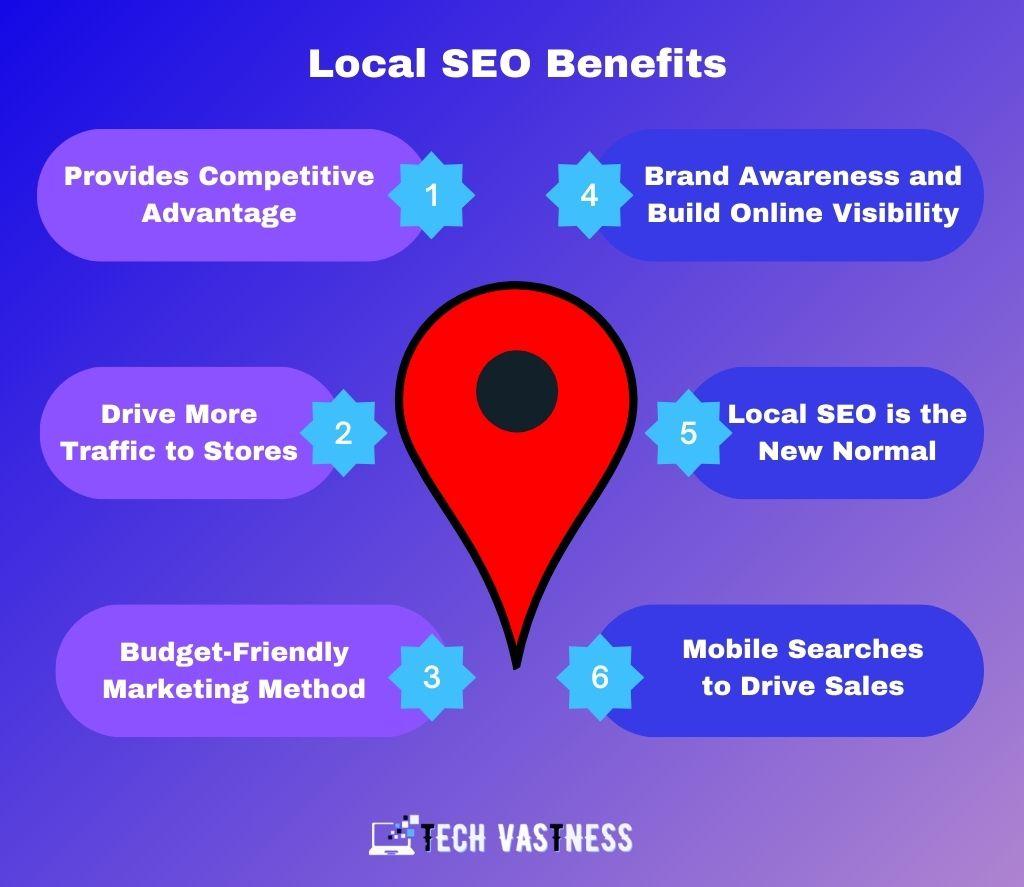
What is local SEO strategy? Now that we have numbers to understand how important local SEO optimization is for businesses let’s look at some local SEO benefits that make it an essential marketing tactic.
1. Provides Competitive Advantage
Every business views ways to outrank its competitors and stay higher in its niche. For this, it uses every possible strategy. Hence, if you are still not using local SEO, make sure that your competitors are, which means they are already way ahead of you and gathering the attention of your target audience.
Even if you are great in the industry and offer higher-notch products, it’s of no use if people can’t seek you. Amidst other websites and businesses ranking top in local search results, they have the power, and you don’t matter to searchers.
Hence, investing in local SEO is your good bet to gain more attention and visibility. Optimizing your website and business for local searchers will help you rise in search engine results and compete with other higher-ranking pages within your niche. As a result, you will also have the opportunity to be listed among the industry’s leading brands.
2. Drive More Traffic to Stores
If you do not embrace local SEO yet, you are missing out on large traffic and sales. When you optimize your website for local SEO listing, it not only attracts people from close places but also potential customers who are visiting the area for a short period.
Local SEO optimization will increase the chances of your website ranking top on SERPs, hence people who are not familiar with the city will rely on Google and can find your business. Also, they will prefer your store to others as you will appear as an organic search result rather than a paid one.
The same stands true for people who are new neighbors to your area. You can appear as an established store and build a strong relationship with them new they arrive in the city.
3. Budget-Friendly Marketing Method
In comparison to other digital marketing strategies, local SEO is the inexpensive and economical method to promote a business. Instances—with a pay-per-click marketing way, you need to pay to appear on higher SERPs and for every click you earn.
In reality, that’s not the case with SEO. Yes, finding reliable SEO services includes costs but yields long-term and profitable results. Also, when a site has good SEO it doesn’t fade away. You need to continue the effort to boost the website’s ranking and optimize it for users.
4. Brand Awareness and Build Online Visibility
What is local SEO optimization is not limited to changing search engine rankings, it also focuses on building credibility and trust. Local SEO optimization is an effective way to do so.
As one of the key ranking factors is prominence, a measure to determine the credibility and authority of a site, you can work on multiple aspects to change your credibility score, such as getting positive reviews from customers, building top-quality backlinks, create optimize Google Business Profile, and create SEO-friendly content, etc.
These factors will affect how users and search engines perceive your business. A case study has proved that people are 70% more likely to visit a local business or store with an optimized GBP, and 50% of users are likely to purchase services or products from businesses with a complete GBP profile.
5. Local SEO Optimization is the New Normal
With evolving user behavior and regular technological advancements, the method people searching for something online is also changing. Local SEO optimization is no longer an option for businesses but a crucial factor for thriving and achieving success in a competitive space.
More than 55% of searchers prefer voice search to find local businesses or stores. Also, people’s search for ‘near me’ has increased tremendously. So, companies need to involve local SEO processes to keep up with the changes in the digital marketing industry.
In 2013, Google introduced the BERT algorithm, who powered by Natural Language Processing (NLP). This technology determines user intent and accordingly provides more personalized, accurate, and relevant results. This has shifted the focus to offering a personal user experience.
Hence, whenever a user searches for something, an NLP-powered algorithm recognizes the search intent and delivers local recommendations based on multiple factors, such as behavior patterns, search history, etc.
6. Mobile Searches to Drive Sales
Whenever we are in the market and have to look urgently for a shop, bakery, restaurant, salon, or store nearby, we immediately pull out our phones to find them.
When we use smartphones to look for a business, we view results from local or nearby locations. Also, most mobile searches lead to sales. So, strong local SEO optimization will make your business more visible online and attract clients easily.
Read Also: What is Off-Page SEO Optimization? Helpful Strategies 2024!
How to Local SEO?
Want to learn how to improve local SEO optimization for your website? I’m here the points mentioned below will help you know how to local SEO:
1. Find Local Keywords
The first thing you’ll want to do is seek high-volume local keywords to rank for. These are keywords that searchers in your area will use to find your business.
I’ve used “home cleaning service in delhi” and restaurant in new delhi” in this example.
2. Optimize Your Website for Local SEO
Now that you know which keywords to rank for, you can optimize your site for local SEO. As well as location-specific keywords, you should add several local SEO-specific elements on your site that you wouldn’t think about when optimizing for constant SEO.
Once you’ve taken care of these issues, follow the few steps below to optimize your website for local search:
- Creating pages for your local keywords: I recommend creating a dedicated page for every relevant keyword in this list. Some pages will cover various keywords (like “home cleaning service in Delhi” and “restaurant in New Delhi”).
- Creating a contact page: you’ll want to ensure you have a dedicated contact page on your website. It’s not just a web design, good practice but it will also help you list your business’s name, phone number, and address (also known as NAP).
- Including every business address: If you have various stores, be sure they are all listed on your site. Better still, create a dedicated locations page displaying all your stores or a dedicated page for each location.
- Ensure your website is mobile-optimized: There’s a great chance local searchers use their phone when they are out and about, hence be sure your site works well on every device.
- Include local schema: Schema markup is the common language search engines use to understand what your site is about. Including the appropriate schema markup for local businesses on your site makes it easy for Google to understand exactly what kind of local business you are.
3. Register and Optimize Your Google Business Listing
What is local SEO optimization? Your Google Business Profile is an important ranking factor for Google’s Local Pack results.
That means one of the first things you should do is register and optimize your Google Business Profile.
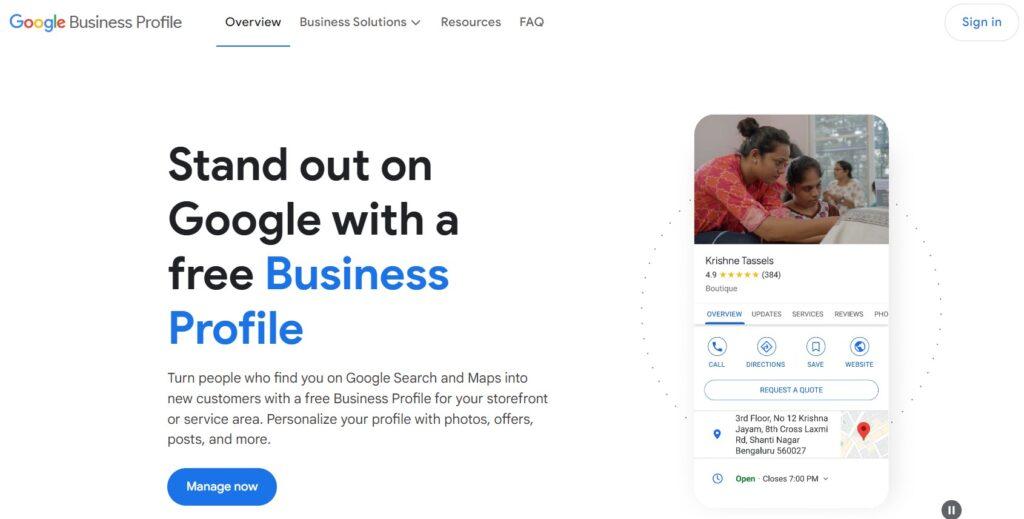
Thankfully, Google makes it easy to create a fresh Google Business Profile. Follow the step-by-step instructions, entering as much information as you can. Seriously, don’t skip a box unless you have to.
Also, please be careful that whatever you fill in on your Google Business Profile matches what’s on your site and anywhere else you write your business details down online.
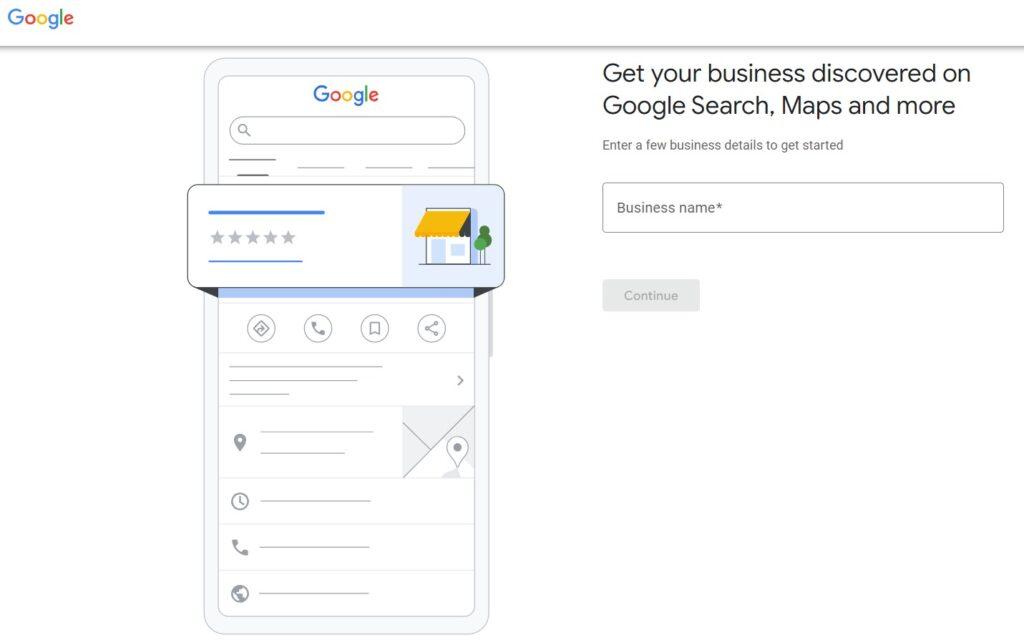
One field I see businesses regularly underestimate or gloss over is the “Business category.” The categories you select here significantly impact the type of searches your business will appear for, hence, choose as many relevant ones as possible.
There is an example of a home that does a great job of picking relevant business categories:
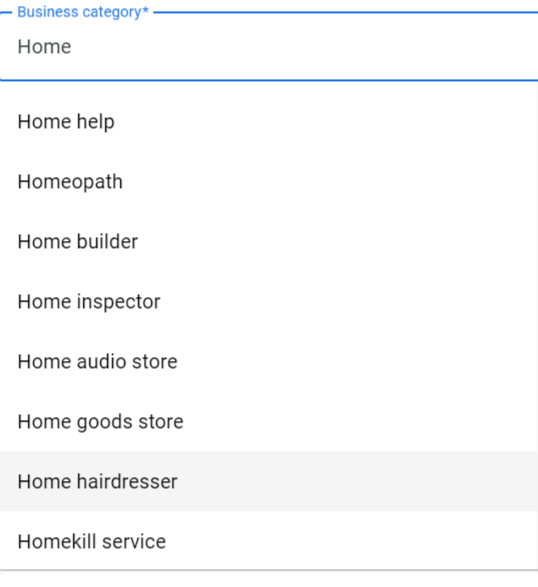
You can tell if you’ve done well as Google provides a profile strength score. You can view it in the search results for your business when signed into Google:
4. Build NAP Citations for Local SEO
A NAP citation is any mention of your business’s name, phone number, and address.
According to experts, citations are a necessary local SEO factor and account for 7% of the algorithm in the local pack and local organic results.
NAP citations are not quite as important as they used to be for local SEO, but they are still a helpful method for users and search engines to seek your local business — and, as such, are good worth creating.
There are a few of my favorite ways to build NAP citations:
- Local web directories: Your city or town probably has at least a few local directories listing businesses.
- Industry web directories: Almost every industry has a relevant directory website where you can include your businesses.
- National web directories: You’ve probably heard of Big-name directories like Yellow Pages.
- Local websites: Getting your business listed on local sites, whether they are news sites or blogs, can be a good source of NAP citations.
Be sure that you keep your NAP consistent everywhere. Use the same spelling of your address and business name. That adds things like shortening Avenue to Ave or adding LLC in your business name.
5. Get as Many Customer Positive Reviews as Possible
Reviews are one of the most important trust builds your brand can have. Virtually everyone (99.9%) checks reviews when online shopping. Over half (57%) of customers specifically read reviews.
Getting more reviews for your business alone should be enough to convince you. But reviews are also an important local SEO ranking factor — and the third important factor for Google’s Map Pack results.
Consequently, you need to encourage as many positive and detailed reviews on Google as possible. Google reviews are the most powerful.
Just view how prominently these reviews are shown in the screenshot below:

You’ll be engaged in acquiring reviews and ongoing processes for the life of your business. Hence be sure to:
- Remind customers to leave a review when they make a buy
- Place a sign at checkout asking consumers to leave a review
- Create a shareable Google review link to promote your clients
- Send an automatic follow-up email requesting a review
- Respond to the reviews you received
Every business will receive negative reviews at a few points along the way. Don’t ignore them, but respond personally and professionally. You never know, you might be able to turn a negative review into a positive one.
Oh, and one more talk. Be sure you guidelines and terms of service of the platform before asking for reviews. For example, Google doesn’t permit you to offer incentives in exchange for reviews.
Read Also: What is Technical SEO Audit? Beginner’s Successful Guide
6. Create SEO-Friendly Content and Get Backlinks
Like regular SEO, creating fresh content and getting backlinks is still most important when optimizing for local SEO.
Hence first, create a blog if you haven’t already, then create a local content plan. There are plenty of things you can blog about, adding:
- New services and products
- How-to guides about your services and industry
- Local events and news
- Interview with other local experts
When writing the articles, add local city and neighborhood names wherever you can. Never will everyone use your city name when searching, so make sure you include neighboring towns and neighborhoods, cities, and unofficial terms that locals may use.
Your blog can help you attract backlinks naturally, but I always advise actively building them where possible. The great news is that all of the link-building tactics you’re familiar with work well for local SEO.
You’ll also be able to build backlinks while creating NAP citations by including your URL in directories and other business listings. These aren’t top-quality links, but they all count.
Finally, don’t forget to conduct a backlink audit of your top competitors and replicate their links if possible.
If Restaurant and Saloon is one of your competitors, you should review every backlink they have with an eye toward two things:
- Domain Quality
- Your ability to secure the link
Reach out to the same websites and tell them why they should link to your website, too. It’s hit or miss, but even if you pick up a few backlinks, it’s a step in the right direction.
7. Invest in Google Ads With Local Keywords
What is local SEO strategy? Okay, this isn’t strictly a local SEO strategy, but it’s a good way to generate local traffic as quickly as possible.
Now, you may think that you could never compete against large businesses when it comes to Google Ads. However, you can if you target local keywords that these brands don’t bid on.
For Instance, instead of targeting “t-shirts for sale,” target “t-shirts for sale in (your city or zip code).”
Even better, you can let Google handle most of the hard work when it comes to creating and managing these campaigns.
Select a Performance Max campaign, and Google will automate your campaign’s targeting, creation, and delivery using the information you provide.
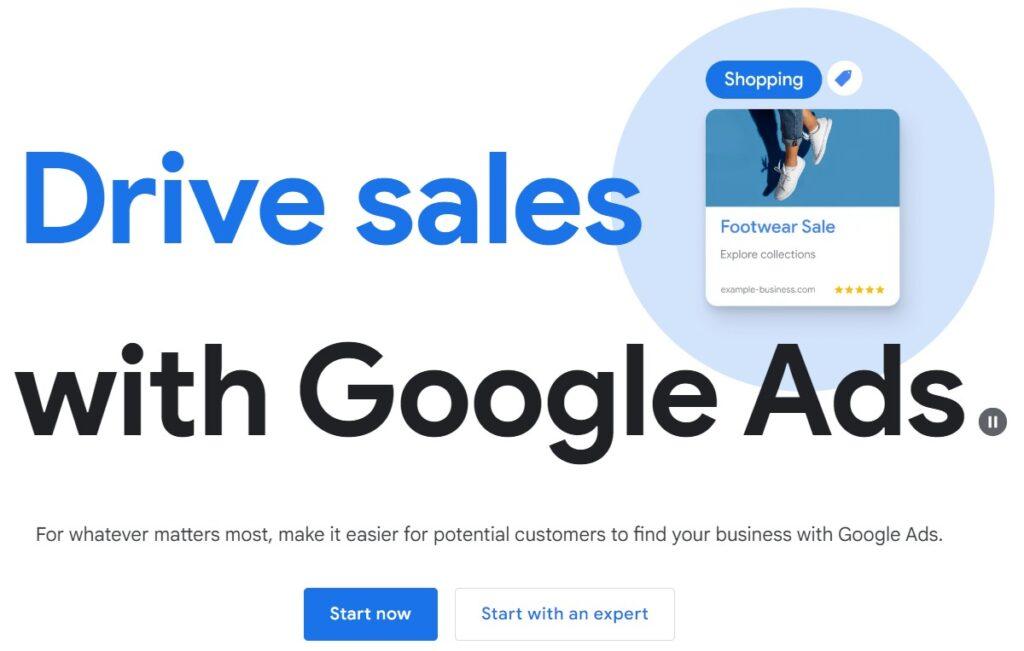
All you have to do is choose your objective as “Local shop visits and promotions” and provide Google with a call to action, ad copy, and relevant videos or images. It takes care of everything else.
Bonus Tip: Host Participate in Local Business Events
Hosting local events helps put a face to your company’s name, lets you connect with clients personally, and, crucially for local SEO, can increase your website’s citations and backlinks.
There’s no shortage of events you could host, adding:
- Charity event
- Networking event
- Business seminar
- Service or Product launches
- Holiday Party
Connect with local blogs and directories to get the word out about your event (and earn a backlink). Alternatively, you can use Google Ads to promote your event if you think enough audiences are searching for an event like yours in the local area.
You don’t just create your local business events. Don’t forget to participate in others as well!
Participating in local business events, especially those with a strong social media presence, can help grow your business in some ways. They’re an opportunity to market your business and an easy step to get to know your customers and the community you serve.
Read Also: What is Off-Page SEO Techniques? 17 Best Methods in 2024!
Important Local SEO Tools
What is local SEO optimization? Some handy tools ensure your business displays up when people search locally.
1. Google Business Manager
Formerly Google Business, this tool helps you manage your Google Business Profile. Signing up for it is free, and each local business owner must use it.
2. Google Search Console
A free tool to monitor your website’s search performance. It shows how much search traffic you get, where it goes, and what keywords it’s coming from.
3. Ahrefs’ Rank Tracker
This tool lets you track up to 10,000 rankings for organic search by country, city, state, and even ZIP code.
4. Ahrefs Link Intersect
This tool enables you to find sites that link to several competitors and is useful for finding relevant industry-specific and local citations.
5. Google Keyword Planner
A free keyword research tool from Google, it is useful for estimating search volumes at the local level.
FAQs on What is Local SEO Optimization and Why It’s Important
Why is local SEO important?
The most significant advantage of local SEO optimization appears first in search engines and Google Maps results. Whenever a business ranks at the higher of local search results, enjoys higher visibility, upsurged website traffic, and more foot traffic to its physical location.
What is locally optimized SEO?
Local SEO is a search engine optimization (SEO) strategy that makes your business more visible in local search results on Google. Any business that has a geographic area or physical location benefits from local SEO.
What are the three pillars of local SEO?
Prominence, proximity, and relevance are the three pillars supporting your business’s local search presence. Local SEO employs creative and technical efforts to notify search engines that your business should be prominent in their results, providing a relevant answer to online users near each business location.
Who uses local SEO?
Local SEO optimization of your digital presence to attract clients from relevant local searches. It is vital for businesses that target local clients, such as hotels, clinics, restaurants, etc
Conclusion
Hopefully, you now know what is local SEO optimization marketing and why it’s so important. If not, then let me recap.
Local SEO optimization is one of the most cost-effective ways for local businesses to increase leads and traffic. National brands with hundreds of local chains can also have a big impact. Follow my advice above to be sure you dominate local results in Google.
But don’t just rely on local SEO optimization alone.
Small local businesses should use standard SEO and social media marketing practices combined with local SEO to improve results. That goes double for large national brands.

